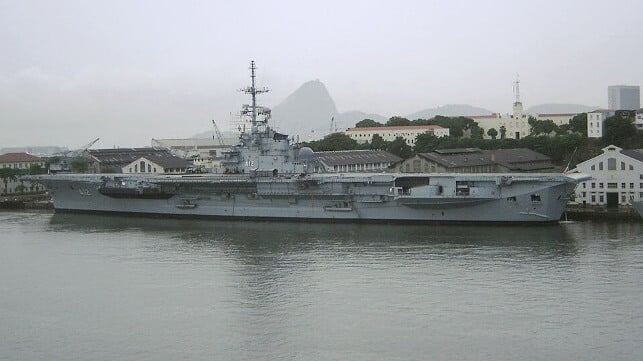Turkey Refuses Entry to Decommissioned Carrier Over Asbestos Concerns

The Turkish government has decided to deny permission for the scrapping of the decommissioned Brazilian Navy carrier NAe São Paulo. Environmentalists believe that the former French Navy vessel (ex name Foch) contains a substantial amount of asbestos, and after the scrapper declined to carry out a new hazardous materials inventory, Turkey's environment ministry said that it would not grant permission for the vessel to enter Turkish waters.
"Due to the fact that the 'Hazardous Goods Inventory Report', which should be prepared by showing the places where asbestos and other dangerous substances are found on the ship plan and photographing the sampling points, was not submitted to our Ministry, it has been decided to cancel the conditional notification approval," said Environment Minister Murat Kurum in a statement.
The decision appears to bring the ship's controversial saga to a close, at least for now. Turkish authorities sent a letter to the Turkish shipyard Sok Denizcilikve Tic (SOK) and the Brazilian government, stopping the carrier from entering Turkey until a new inventory on hazardous materials was conducted in accordance with the European Union Ship Recycling Regulation. The initial inventory provided by the seller found only nine tonnes of asbestos on board; Foch's sister ship, Clemenceau, notoriously contained upwards of 700 tonnes of the toxic substance.
The letter was dated five days after São Paulo departed Rio de Janeiro under tow to Aliaga for dismantling. SOK, which specializes in dismantling large decommissioned vessels, bought the hull of the aircraft carrier for around $2 million in March 2021.
On August 22, the Brazil environmental agency IBAMA responded stating that the vessel had already left Brazilian territorial waters, making it impossible to enforce the IHM directive. “We state that, as we received your communication on August 9th, 2022, the vessel had already left Brazilian territorial waters, according to information from the Brazilian Navy. The vessel is following its predicted course, its location is known and has been followed remotely,” said the letter.
Environmental activists assert that the demolition voyage violated the Basel and Barcelona Conventions. In addition, they suggest that the initial hazardous material inventory did not appear credible because it found suspiciously little asbestos - and no PCBs at all. The use of PCBs in deck flooring, gaskets, rubber parts, insulation, paints, etc. was common at the time that Foch and Clemenceau were built in France. In addition, they raised the concern that Foch could also have been contaminated by radioactive material due to her involvement in (long-ago) atmospheric nuclear bomb testing in the Pacific.
“Turkey is to be applauded for asking for a true and accurate survey and inventory. The current one is simply not believable based on what we know about older aircraft carriers. We have real concerns that the provided inventory grossly underestimates the hazardous and radioactive materials on board the São Paulo,” said Nicola Mulinaris, NGO Shipbreaking Platform Policy Advisor.
The denial of entry does not appear to have affected the carrier's voyage yet. As of Friday night, her salvage tug (Alp Centre) maintained course and heading, moving at seven knots northbound through the Canary Islands.

that matters most
Get the latest maritime news delivered to your inbox daily.
Top photo NAe São Paulo docked in Rio de Janeiro in 2008 by Eric Gaba (CC BY SA 3.0)
